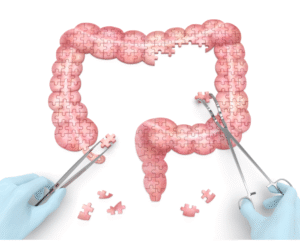Intestinal Surgeries

Intestinal surgeries encompass a wide range of procedures performed to treat various conditions affecting the intestines, including the small intestine and large intestine (colon). These surgeries may be necessary to address issues such as bowel obstruction, inflammatory bowel disease (IBD), colorectal cancer, diverticulitis, hernias, and other gastrointestinal disorders. In this guide, we’ll explore different types of intestinal surgeries, their indications, surgical techniques, recovery process, and potential complications.
Types of Intestinal Surgeries:
Bowel Resection:
- Involves removing a portion of the intestine affected by conditions such as tumors, strictures, or ischemia (reduced blood supply).
- Types of bowel resections include small bowel resection and colectomy (removal of part or all of the colon).
Ileostomy and Colostomy:
- Surgical creation of an opening (stoma) in the abdomen to divert intestinal contents to an external pouch (ileostomy for the small intestine, colostomy for the colon).
- Indicated for conditions like inflammatory bowel disease (IBD), colorectal cancer, or severe bowel obstruction.
Intestinal Bypass Surgery:
- Redirects the path of intestinal contents to bypass a diseased or obstructed segment of the intestine.
- Commonly performed for managing intestinal strictures, tumors, or fistulas.
Hernia Repair Surgery:
- Addresses hernias that involve a portion of the intestine protruding through a weakened abdominal wall.
- Surgical techniques may include open hernia repair or minimally invasive laparoscopic hernia repair.
Appendectomy:
- Surgical removal of the inflamed appendix, typically performed in cases of acute appendicitis to prevent complications like appendiceal rupture.
Bowel Diversion Surgery:
- Redirects the flow of intestinal contents to manage conditions such as ulcerative colitis, Crohn’s disease, or severe bowel obstruction. Normally, this mean creation of a stoma (ileostomy/ colostomy).
Indications for Intestinal Surgery:
1: Bowel Obstruction:
- Blockage of the intestines due to tumors, adhesions, hernias, or strictures, causing abdominal pain, bloating, and vomiting.
2: Inflammatory Bowel Disease (IBD):
- Surgical intervention may be necessary for complications of IBD such as intestinal strictures, abscesses, or fistulas.
3: Colorectal Cancer:
- Surgical resection of cancerous lesions in the intestines is a primary treatment modality, often combined with chemotherapy or radiation therapy.
4: Diverticulitis:
- Severe cases of diverticulitis, characterized by inflammation or infection of diverticula (small pouches in the colon), may require surgery to remove affected segments.
5: Intestinal Trauma or Perforation:
- Surgical repair/ resection is needed for intestinal injuries, perforations, or lacerations caused by trauma or underlying medical conditions.
Surgical Techniques for Intestinal Surgeries:
1: Open Surgery:
- Involves making a larger incision in the abdomen to access and operate on the intestines.
- Open surgeries provide direct visualization of the surgical field and are suitable for complex or extensive procedures.
2: Laparoscopic Surgery:
- Minimally invasive approach using small incisions and specialized instruments, including a laparoscope (camera), for internal visualization.
- Laparoscopic techniques offer benefits such as reduced postoperative pain, shorter recovery, and smaller scars compared to open surgery.
3: Robotic Surgery:
- Utilizes robotic-assisted technology to enhance surgical precision and dexterity, particularly in minimally invasive procedures like colorectal surgery.
- Robotic surgery may result in improved outcomes and faster recovery for certain intestinal surgeries.
Recovery Process After Intestinal Surgery:
1: Hospital Stay:
- The length of hospitalization depends on the type of surgery, patient’s condition, and postoperative recovery progress.
- Patients undergoing major intestinal surgeries may require several days to a week or more in the hospital for monitoring and initial recovery.
2: Pain Management:
- Pain medications are prescribed to manage postoperative discomfort, which may include oral medications or intravenous (IV) pain relief.
3: Dietary Progression:
- Patients start with a clear liquid diet and gradually transition to soft foods before resuming a regular diet based on their tolerance and surgical recovery.
4: Wound Care:
- Proper wound care is essential for incision sites, including keeping the area clean, dry, and monitoring for signs of infection.
5: Activity and Mobility:
- Patients are encouraged to engage in gentle movement and walking as tolerated to prevent complications such as blood clots and promote healing.
Conclusion:
Intestinal surgeries encompass a diverse range of procedures aimed at treating conditions affecting the intestines, including bowel resections, stomas, bypass surgeries, and more. These surgeries are tailored to each patient’s specific diagnosis, symptoms, and overall health status, with the goal of improving gastrointestinal function, alleviating symptoms, and preventing complications.
Advancements in surgical techniques, such as minimally invasive laparoscopic and robotic-assisted surgeries, have led to reduced postoperative pain, faster recovery times, and improved outcomes for many patients undergoing intestinal procedures. However, like any surgical intervention, intestinal surgeries carry potential risks and complications that require careful management and monitoring by healthcare professionals.
Patients considering intestinal surgery should discuss the benefits, risks, and expectations with their healthcare providers to make informed decisions and optimize their surgical outcomes and recovery. Regular follow-up appointments and adherence to postoperative care instructions are crucial for successful recovery and long-term gastrointestinal health.
